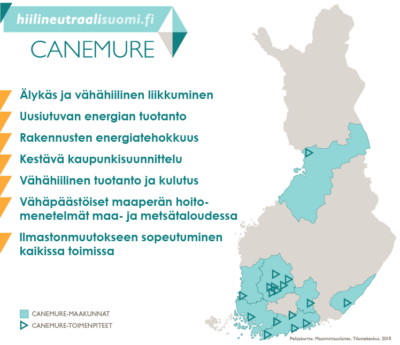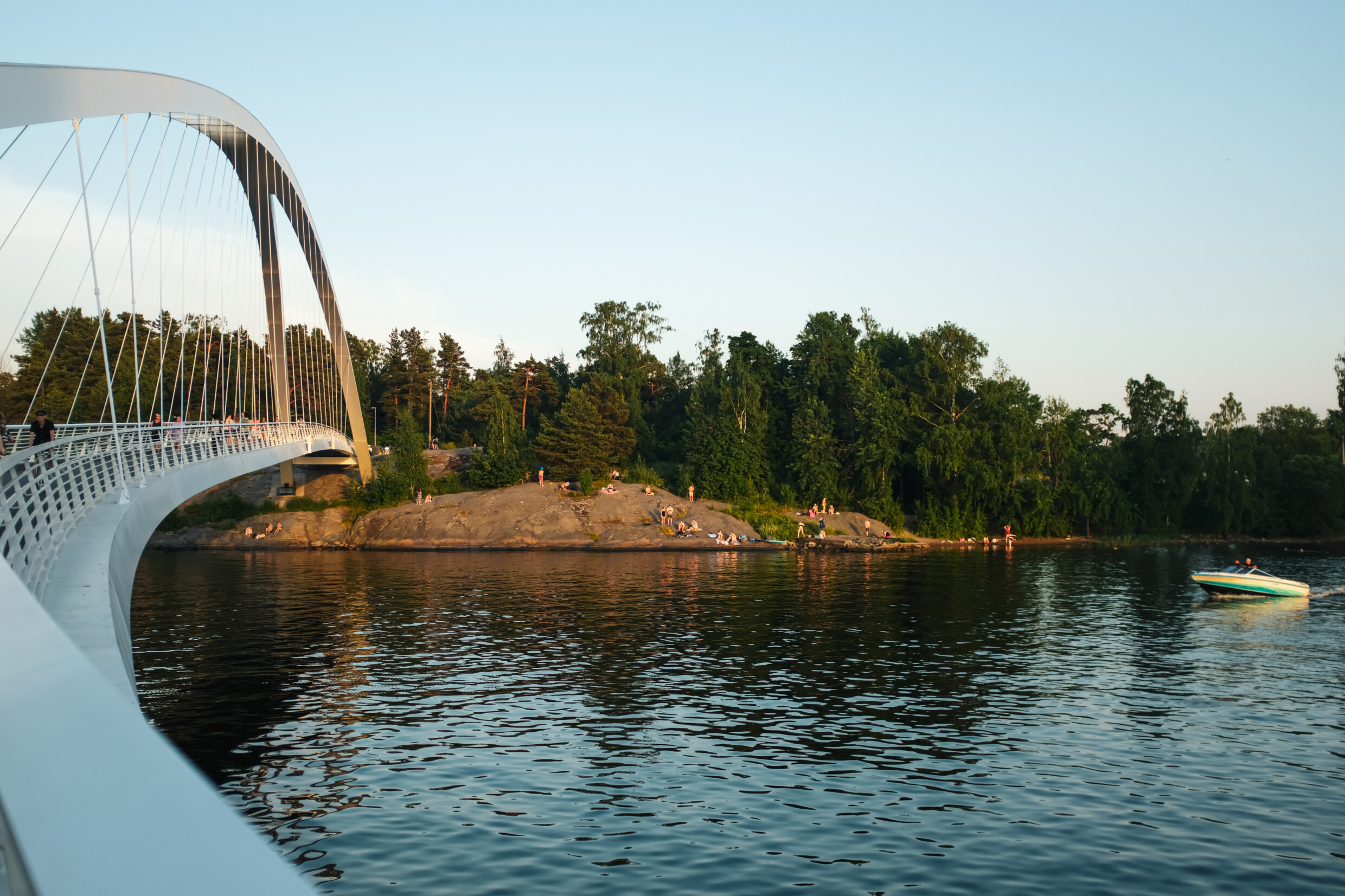Canemure – Towards Carbon Neutral Municipalities and Regions

The goal of the city of Helsinki action is to find ways to mitigate climate change through procurement. We are aiming at making sustainability and low-carbon key factors in procurement processes.
In this action we selected several pilot procurements and in those procurement processes we tried to take the low-carbon and other environmental and responsibility aspects into account in the best possible manner. In particular, it was investigated how the calculation of the carbon footprint could be applied in different procurement groups and what kind of criteria can be formed for the carbon footprint.
The aim was to create successful examples and applicable tools that contribute to the development of sustainable procurement in Helsinki and in other cities in Finland.

Canemure – Towards Carbon Neutral Municipalities and Regions
Years of operation
11/2018 – 10/2024
Responsible person
Team Manager
Markus Lukin
firstname.lastname@hel.fi
+358 9 310 31606
Financing
The EU’s LIFE programme, Ministry of the Environment, Ministry of Transport and Communications, Ministry of Agriculture and Forestry, The Finnish Energy Authority (Energiavirasto), The Finnish Innovation Fund Sitra, The Centre for Economic Development, Transport and the Environment of Pirkanmaa, Kangasala, Lempäälä, Nokia, Orivesi, Pirkkala, Vesilahti, Ylöjärvi
In this course you will learn about low-carbon public procurement. The course includes an introduction and five modules. The duration of the course is about 60 minutes. If you have trouble opening the link, the course is also available at Library of Open Educational Resources (after opening the site, please select “EN” on the upper right-hand corner and then “Open educational material in a new tab”).
Cooperation and tools:
- Kaupunkiympäristön aineistoja 2024:20:
Selvitys päästöttömät työmaat green deal -vaatimusten vaikutuksista (pdf, in Finnish) - Kaupunkiympäristön aineistoja 2021:6: Työvaatehankinnan elinkaarivaikutukset – Ilmastovaikutukset, vedenkulutus ja kustannukset (in Finnish)
- Kaupunkiympäristön aineistoja 2020:31: Peruskorjaushankkeen energiaoptimointi ja elinkaaren hiilijalanjälkilaskenta (in Finnish)
- Kaupunkiympäristön aineistoja 2020:30: Hämeentien CO2-päästölaskenta ja ilmastoviisaat tarkastelut (in Finnish)
- Kaupunkiympäristön julkaisuja 2020:27: Infrastruktuurirakentamisessa käytettävien muovilaatujen korvaaminen kierrätettävyydeltään ja hiilijalanjäljeltään paremmilla valinnoilla (in Finnish)
- Suomen ympäristökeskuksen raportteja 15/2020: Tuotteiden ympäristöjalanjälkimenetelmä PEF – Käyttö julkisten hankintojen ilmastovaikutusten arvioinnissa (in Finnish)
- Reports of the Finnish Environment Institute 15/2020: Product Environmental Footprint (PEF) method – Use for evaluating the climate impacts of public procurement (English)

The project involved a total of nine pilot procurements:
1. In the design and build contract, bidders calculated the carbon footprint of their plans during the tender phase, which was then scored as part of the tender.
2. The carbon footprint of the restaurant service of the new division building will be calculated during the contract period.
3. In repaving contracts, data is collected from contractors during the contract period in order to calculate the contract’s carbon footprint. We also participate in the development of a common carbon footprint tool for the asphalting industry
4. In the procurement of dairy products, the market’s readiness for carbon footprint calculation was surveyed, and the supplier’s action plan to reduce the carbon footprint during the contract period was required.
5. In the procurement of meat products, the market’s readiness for carbon footprint calculation was surveyed, and the supplier’s action plan to reduce the carbon footprint during the contract period was required.
6. In the procurement of food services in residential homes, the aim is to reduce the carbon footprint during the contract period by means of sustainability action plan.
7. In the project planning phase of the renovation of a residential apartment building, the carbon footprint and life cycle costs of the building are optimized, as well as the energy consumption and life cycle costs.
8. An emission assessment to direct the planning will be carried out during the street and water supply planning. The carbon footprint will also be taken into account later in the contract phase.
9. In textile procurements, it will be examined whether a service procurement is more sustainable option compared to a product procurement in terms of life cycle effects.
The key factors behind the successful pilots were active market dialogue and cooperation with companies, research institutes and other municipalities and cities.
Pilot procurement processes were carefully documented to evaluate results and share information. In addition to emission reductions, the impact of completed procurement was also assessed from a life-cycle cost perspective, when possible.
At the same time with the selection of pilot procurements, an assessment of the carbon footprint of the City of Helsinki’s procurements was launched in cooperation with Syke. The assessment was completed in autumn 2019. The results can be used to assess the significance of procurement groups from a climate perspective, as well as to perceive where emission reduction measures should be targeted. The good practices are actively shared and the competence of the suppliers is developed by providing guidelines, tools and procurement training. The aim is that procurements inspired by the project can be carried out in other cities in Finland as well.
Contact
Team Manager Markus Lukin (tel +358 9 310 31606, firstname.lastname@hel.fi) is responsible for the operations under the sub-project of the City of Helsinki. The Canemure consortium is coordinated by the Finnish Environment Institute SYKE, where Senior Research Scientist Laura Saikku acts as the Project Manager (tel. +358 29 525 1140, firstname.lastname@syke.fi).
This online service has been carried out with the financial contribution of the LIFE Programme of the European Union. The online service reflects only the CANEMURE project’s view, and the CINEA/European Commission is not responsible for any use that may be made of the information it contains.

